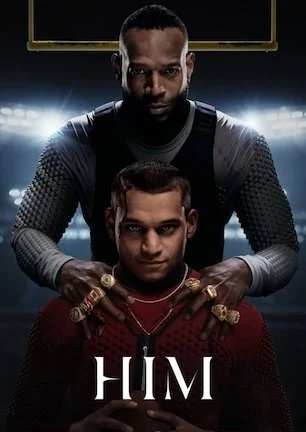Studio: Blumhouse
Director: Akiva Goldsman
Writer: Ben Collins, Luke Piotrowski
Producer: Jason Blum, Ellen Goldsmith-Vein, Adrienne Biddle, Matt Kaplan
Stars: Shree Crooks, Frank Grillo, Anna Torv, Jonah Beres, Lasaundra Gibson, Samantha Smith
Review Score:
Summary:
An orphaned child harboring an extraordinary ability hides in an empty house surrounded by an unseen monster.
NOTE: Since the Overlook Film Fest in 2017, "Stephanie" was recut for its 2018 home video release to exclude the sci-fi bookends referenced in this review.
Review:
Producer Jason Blum and filmmaker Akiva Goldsman premiered their creepy kid chiller “Stephanie” at the 2017 Overlook Film Festival. Following the pair’s post-screening Q&A, the loudest chatter online and in the lobby involved a reveal that the duo would reteam for a new adaptation of Stephen King’s “Firestarter.”
That’s a relevant note because it partially explains why “Stephanie” feels like a trial run for a much better telekinetic thriller with far greater scope. It also speaks volumes about “Stephanie’s” limp impact in that the audience immediately moved on, interested more in digesting a morsel of news about what might be next instead of the meal of the movie just eaten.
Clearly envisioned at one time to be a more complicated movie than what the festival cut became, the film’s whittled-down form shapes it as a routine haunted horror story. Yet The Powers That Be couldn’t bring themselves to completely strip the bookending narrative. So “Stephanie” is uncomfortably stuck inside a sci-fi sandwich framing device its simplicity immediately outgrows having any practical use for.
Opening scenes introduce 2027 America. An unspecified epidemic has quarantined survivors hiding in homes from unseen monsters. Harold Perrineau and Kenneth Choi are thrown away in a one-and-done scene as their characters, credited as ‘Leader’ and ‘Technician’ as if to emphasize their irrelevance, stalk about in search of subjects who are taken to a research facility. There, memories are extracted to learn more about what is contributing to the unknown crisis and how it can be controlled.
File all of this away somewhere unimportant. None of the above comes into directly significant play until the epilogue. Someone just thought it mattered that we see two random scientists, not even Perrineau or Choi, watching Stephanie’s story on a video screen before getting into her tale for ourselves.
Stephanie is an apparent orphan living alone in her family’s house in the wake of this mystery situation that has invisible forces lurking around outside. Instead of mass panic or crumbling landscapes, “Stephanie” starts on only this one person, making the film’s first half a narrow POV look behind the curtain of a catastrophe.
This kind of quiet introduction works to better effect in traditional apocalyptic scenarios, where decaying environments are established or we see how society has adapted to new modes of survival. Here, we see Stephanie talking to her favorite stuffed animal, brushing her teeth with too much toothpaste, and reading herself a bedtime story since there is no one else around. It’s a long drag of watching a young girl play ordinary make believe, waiting for the first act to offer some incentive for getting invested in the unexplained mystery at large.
Stephanie the character gets little help in the engagement department from young Shree Crooks, who in turn gets little help from too many flatly scripted scenes of mundane moments. Thinking back on star turns from child actors like Haley Joel Osment in “The Sixth Sense” or Kirsten Dunst in “Interview with the Vampire,” Crooks isn’t operating at a high enough level of charm to drive a single protagonist scenario by herself.
Eventually, the plot slow rolls into standard alone in the house supernatural suspense. It shouldn’t be a spoiler to mention that Stephanie’s parents make an unexpected return from wherever it is they went. “Stephanie” then adds a layer of “what’s really going on?” paranoia through cryptic whispers and more breadcrumb reveals of the larger world hinted at in the opening.
But Akiva Goldsman can’t find a way to deliver a silent scare of atmospheric dread. Every uninventive fright comes courtesy of a quick volume knob turn, never natural atmosphere. When tension is built, it comes with small stakes of wondering whether or not Stephanie is going to cut her foot on broken glass or some other household danger. “Stephanie” is so insular and expands so gradually that interest in wherever it is going can’t help but evaporate along the way.
The movie’s major mistake is teasing the notion that a more creative cut exists somewhere in material we are not allowed to see. It was instead decided to shred the setup to ribbons and deliver a generic, minimalistic thriller, likely with the mindset of having an easier to explain marketing angle.
As this review is based on the debut screening, one hopes the filmmakers reconsider another trip to the editing bay before releasing the film to the wild. Someone with sway needs either the guts to fully restore the surrounding story, or the sense to accept it is a distraction demanding to be excised entirely. Either option would be a coherence and quality improvement.
Review Score: 40






More of a ”side of the road” stop than destination entertainment, “Shelby Oaks” would fit well in a faux documentary marathon, just not as the main draw.